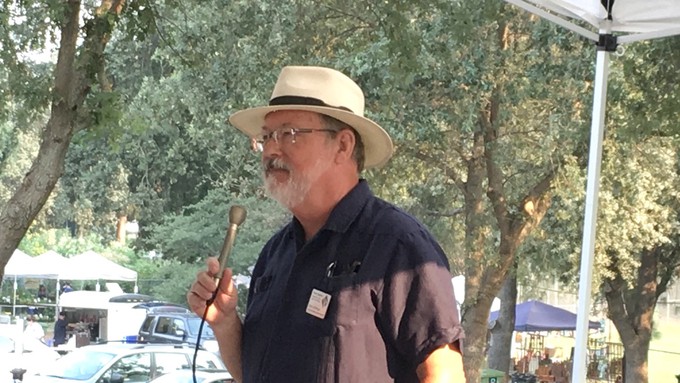
At day-long free event, experts offer advice to inspire spring gardening

Farmer Fred Hoffman will speak on spring gardening at 1 p.m. Saturday. Kathy Morrison
Does spring have your green thumb itching? Or do you need a little inspiration to go along with some expert advice?
Find it Saturday during “Grow Orangevale,” a special event aimed at introducing people of all ages to gardening. Set for Saturday, March 25, the free gardening event will be held at the Orangevale branch of the Sacramento Public Library. As an extra special treat, Farmer Fred Hoffman – host of the popular podcast, “Beyond the Garden Basics with Farmer Fred” – and rose and insect expert Baldo Villegas – Sacramento’s “Bug Man” – will be among the featured speakers.
“There’s no substitute for vegetables harvested from your own yard!” say the organizers. “This will be the topic of the presentations from UC Master Gardeners of Sacramento County. … Whether you have a sunny balcony or a spacious lot, you can enjoy produce grown mere steps from your own back door. Join us for this presentation and other gardening-related programs throughout the day.”
Events will be held from 10 a.m. to 4 p.m. with something for every gardener from beginner to veteran.
At 10 a.m., start with a community seed and plant swap. Patrons are urged to bring something from their garden – cuttings, seedlings, root divisions, seeds, etc. – and take something home to plant.
At 11:30 a.m., join Jesse Blacksher from the Orangevale Foodbank Farm and Nelson Kirk from the Orangevale Recreation and Park District as they answer your questions about organic gardening and caring for your trees.
That’s followed at noon by a native plant workshop. Colene Rauh from the California Native Plant Society will discuss the ecological importance of native plants in your landscape.
At 1 p.m., Sacramento County master gardener Andi McDonald will discuss the basics of starting and maintaining a home vegetable garden – what, when, and where to plant.
Then at 2 p.m., Farmer Fred – a lifetime master gardener – will present tips on spring gardening. The former radio host also will answer questions.
Rounding out the workshops at 3 p.m. will be Orangevale’s own Baldo Villegas, an award-winning Master Consulting Rosarian. Baldo, who grows thousands of roses at his Orangevale home, will discuss how to grow and care for roses in your landscape. A retired state entomologist, he also will discuss how pests and diseases affect roses and how we can control them.
The Orangevale branch library is located at 8820 Greenback Lane, Suite L, Orangevale.Details: https://sacmg.ucanr.edu/.
Comments
0 comments have been posted.Sacramento Digs Gardening to your inbox.
Sites We Like
Garden Checklist for week of July 21
Your garden needs you!
* Keep your vegetable garden watered, mulched and weeded. Water before 8 a.m. to reduce the chance of fungal infection and to conserve moisture.
* Feed vegetable plants bone meal, rock phosphate or other fertilizers high in phosphate to stimulate more blooms and fruiting. (But wait until daily high temperatures drop out of the 100s.)
* Don’t let tomatoes wilt or dry out completely. Give tomatoes a deep watering two to three times a week.
* Harvest vegetables promptly to encourage plants to produce more. Squash especially tends to grow rapidly in hot weather. Keep an eye on zucchini.
* Pinch back chrysanthemums for bushy plants and more flowers in September.
* Remove spent flowers from roses, daylilies and other bloomers as they finish flowering.
* Pinch off blooms from basil so the plant will grow more leaves.
* Cut back lavender after flowering to promote a second bloom.
* It's not too late to add a splash of color. Plant petunias, snapdragons, zinnias and marigolds.
* From seed, plant corn, pumpkins, radishes, winter squash and sunflowers.